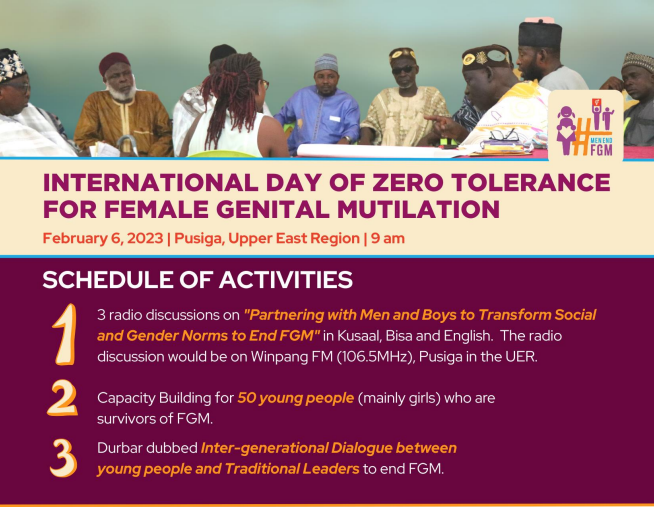UNFPA Ghana Country Office, Accra, 6 February – The United Nations Population Fund (UNFPA) defines Female Genital Mutilation (FGM) as “a practice that involves altering or injuring the female genitalia for non-medical reasons.” The practice is internationally recognized as a gross violation of human rights and an estimated 200 million women and girls across the world have undergone some form of FGM.
At the global level, since 2008, UNFPA and UNICEF have been leading a joint programme to eliminate FGM in 17 countries. Annually in Ghana, the UNFPA Country Office has worked with the Ministry of Gender, Children & Social Protection, NGOs, traditional authorities, religious leaders, women and advocates to stem the tide of FGM in our communities.
In line with the global theme for observing this year’s International Day of Zero Tolerance for FGM, we call on the Government of Ghana through the Ministry of Gender, Children & Social Protection, UN agencies, development partners, traditional and religious leaders, and NGOs to:
● Partner and engage men and boys to shift unequal power relations and challenge the
attitudes and behaviours caused by gender inequality leading to FGM.
● Change the social norms that perpetuate FGM.
● Invest in national and local-level policies to protect the rights of girls and women,
including the development of action plan to end FGM.
The UNFPA Ghana Country Office and its partners, including the Embassy of Norway in Ghana, will be observing the International Day of Zero Tolerance for FGM with a series of activities including a dialogue with men and boys on FGM and a durbar for sensitization of traditional leaders, particularly the male leaders to lead the charge to end FGM on Monday, February 6, 2023 at Pusiga in the Upper East Region.
Let us be reminded of the urgent need for more concerted efforts and investments to eliminate the harmful practice of FGM. We need men and boys to create safe environment for women and girls to live free of FGM including raising awareness about FGM, reporting cases of FGM, speaking up against the social norm that perpetuate FGM, and in supporting their sisters and daughters not to undergo FGM. We can all do our parts to protect the millions of girls and women at risk of FGM.
About UNFPA
UNFPA is the United Nations sexual and reproductive health agency. Our mission is to deliver a world where every pregnancy is wanted, every childbirth is safe and every young person's potential is fulfilled.
For further information, contact:
Doris Mawuse Aglobitse, PhD., Gender Team Lead, UNFPA Ghana | This email address is being protected from spambots. You need JavaScript enabled to view it.
Cynthia Prah, UN Information Centre (UNIC) Accra | This email address is being protected from spambots. You need JavaScript enabled to view it.
Jean-Philip Lawson, UNFPA Ghana | This email address is being protected from spambots. You need JavaScript enabled to view it.


